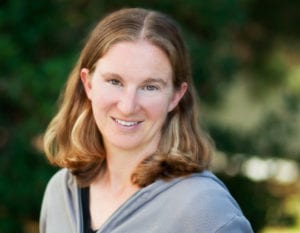Foundation Alumna Sarah J. Gilliland Looks to Strengthen Physical Therapy Profession Through Education
As a student, Sarah J. Gilliland, PT, DPT, PhD, saw an unmet need in physical therapy research – education. As an assistant professor, she strives to expand physical therapy education research. With the support of the Education Section of APTA, the Foundation for Physical Therapy offers scholarships to support people like Gilliland in their work.
For nearly 40 years, the Foundation for Physical Therapy has been creating a pipeline for future researchers and sowing the seeds for researchers to come. The Foundation promotes scientifically based and clinically relevant research across a wide range of physical therapy disciplines. However, the importance of one discipline in particular has gone unnoticed by Foundation funding applicants — education research.
In 2007, the Academy of Physical Therapy Education of the American Physical Therapy Association (APTA) set up a Foundation fund to support education research in physical therapy. Despite the available support for post-professional doctoral students in this research specialty area, few have applied.
To promote the significance education research can have on the profession, past Foundation scholarship recipient Sarah J. Gilliland, PT, DPT, PhD, wants to emphasize that “education, like clinical practice, requires ongoing thought and development [and that] knowledge alone does not make one an educator.”
Gilliland was the recipient of two Promotion of Doctoral Studies (PODS) I Scholarships (2011 and 2012) and a PODS II Scholarship (2014). This funding helped support the completion of her PhD in Education at the University of California, Irvine. She has always wanted to become an educator of some sort. It was during countless visits to her physical therapist in high school that she developed a love for the profession. She found the perfect job that combined her two passions while working as a teacher’s assistant at Chapman University.
Throughout her career, Gilliland felt that physical therapy education was not held to the same expectations as some other professions. Teaching practices ranged from very effective to very ineffective.” There was no attention from the program to addressing how content was organized and taught to students,” She noted. “There really was no base of educational literature to effectively inform teaching and curricular practices in physical therapy education.” This motivated her to pursue higher learning and focus her research on physical therapy education.
“Throughout my education, I learned the importance of evidence-based practice in physical therapy clinical practice,” said Gilliland. And for that she says “a solid foundation of relevant educational research is needed to draw upon.”
“Educational research is important for improving the way we educate students entering the profession, as well as, clinicians seeking continuing education or residencies and fellowships,” she says. “We have made great strides in developing our evidence base to support our clinical practice, but we have very little educational research in physical therapy to inform our educational practices. Many educators continue to function based on old beliefs that giving students information is what teaching is about. We need to build our education research in physical therapy to demonstrate the more effective ways of teaching that will support students in effectively learning and continuing to engage in learning throughout their careers.” She also explains that with the growing cost of education, educators are more responsible than ever to use the most effective and efficient ways to teach.
Gilliland is currently an assistant professor at Chapman University’s Crean College of Health and Behavioral Sciences. She is investigating how physical therapy students develop their clinical reasoning capabilities. One collaborative project she is working on is a concept analysis of clinical reasoning in physical therapy. She is also involved in a longitudinal study of physical therapist students that looks at what models of practice students entered school with and whether these perspectives changed over the course of their education.
Gilliland hopes that her research will help students in their careers. Through education, she hopes to encourage resourceful and critical thinkers who can address patients’ specific needs. Moreover, she hopes that having a greater body of educational research will raise the level of practice in clinicians and build public trust in the profession.
Each year, the Foundation accepts applications for the PODS I and II scholarships starting in the fall. One of these scholarships is available to support post professional graduate education of physical therapists and physical therapist assistants seeking advanced degrees to become teaching faculty in physical therapy educational programs. The Foundation will be offering a PODS scholarship funded by the Academy of Physical Therapy Education that will support post-professional doctoral students engaged in research relevant to physical therapy education, including, but not limited to, research on teaching models, student learning outcomes, and teaching and learning environments.
Learn more about the Foundation’s funding opportunities and how you can apply for an education research scholarship.
Select Foundation Grants and Scholarships Awarded
SARAH J. GILLILAND, PT, DPT, PhD
